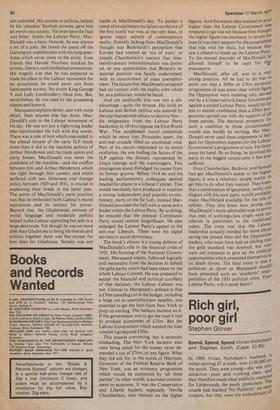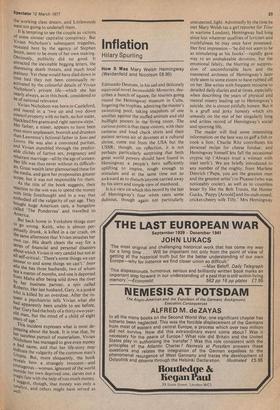Rich girl, poor girl
Stephen Glover
Spend, Spend, Spend Vivian Nicholson and Stephen Smith (Cape 0.95) In 1960 Vivian Nicholson's husband, a miner earning £7 a week, won £150,000 00 the pools. They were young—she was very attractive—poor and working class, and they therefore made ideal publicity material for Littlewoods, the pools promoters. The couple had marked 'No Publicity' on their coupon, but they were the embodiment of
the working class dream, and Littlewoods were not going to undersell them.
It is tempting to see the couple as victims of some sinister capitalist conspiracy. But Vivian Nicholson's subsequent tragedies, revealed here by the agency of Stephen Smith, seem to be more of her own making. Obviously, publicity did no good. It attracted the inevitable begging letters, the distressing death threats, and much local Jealousy. Yet these would have died down in time had they not been continually reactivated by the colourful details of Vivian Nicholson's private life—which she has nearly always, as in this book, considered to be of national relevance.
Vivian Nicholson was born in Castleford, and reared in a 'two up and two down council property with no bath, no hot water, black lead fire grates and right narrow steps. Her father, a miner, appears to have been even more unpleasant, boorish and drunken than Lawrence's fictional father in Sons and Lovers, He was also a convinced puritan, and Vivian stumbled through the predictable clichés of furtive sex, pregnancy and reluctant marriage—all by the age of sixteen. Her life was thus never without its difficulties. Great wealth later glamourised these for the media, and gave her propensities greater seoPe, but it was not responsible for them. As the title of the book suggests, their reaction to the win was to spend the money With little forethought and in a way that embodied all the vulgarity of our age. They bought huge American cars, a bungalow called 'The Ponderosa' and travelled to America.
But back home in Yorkshire things start l° go wrong. Keith, who is almost perPetuallY drunk, is killed in a car crash, on the same afternoon that Vivian smashes her Own car. His death clears the way for a series of financial and personal disasters about which Vivian is very candid but not at all self-critical: 'There's some things we can answer to and some things we can't.' Inter '210 she has three husbands, two of whom last a matter of months, and one is deported from Malta after being sold down the river °_,Y her business partner, a spiv • called Koberto. Her last husband, Gary, is a junkie who is killed by an overdose. After the inpest a psychiatrist tells Vivian what she had apparently been unable to see before, that 'Gary had the body of a t h irty-two-yearold man, but the mind of a child of eight Years of age.' This incident expresses what is most dePressing about the book. It is true that, by h_ er tasteless pursuit of materialism, Vivian Nicholson has managed to give even money a bad name, and that her life-story may lndlcate the vulgarity of the common man's u t°131a. But, more eloquently, the book reveals how a strangely innocent—and e°urageous—woman, ignorant of the world °tItside her own deprived one, carves out a ',ram fate with the help of too much money. i-iggest, though, that money was only a catalyst, and others might have served as Well







































 Previous page
Previous page